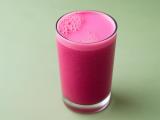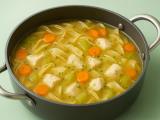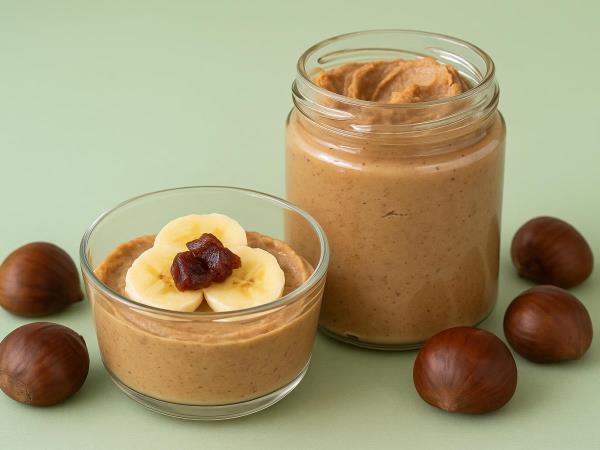Today, we roast, boil, and sometimes even fry chestnuts, using them to make desserts. Interestingly, chestnuts have a very low fat content compared to other nuts. This means fewer calories from fats, leaving more room for other beneficial nutrients.
Nutritional Value of Chestnuts
Here are the specific numbers:
- In 100 grams of chestnuts, there are around 206 calories of energy.
- Proteins (for muscle and cell building) are around 2.7 g per 100 g.
- Fats are very low - only around 1.9 g per 100 g.
- Carbohydrates: a range of starch, sugars, and fibers, totaling around 44.5 g per 100 g.
- Fiber: (digestive aid promoting intestinal movement) around 4.3 g.
Additionally, chestnuts contain vitamins and minerals: potassium, magnesium, copper, manganese, along with vitamin C and some B vitamins. Interestingly, among nuts, chestnut is the only one that contains noticeable amounts of vitamin C. However, during cooking or baking, some of the vitamin C is lost as it is sensitive to heat.
How Chestnuts Affect Health
- Strong Shield with Antioxidants
Chestnuts contain compounds known as antioxidants. These substances defend our cells against harmful radicals (unstable molecules that can damage cells). Among these compounds are gallic acid, ellagic acid, tannins, and other polyphenols.
Studies have shown that chestnuts actually exhibit high antioxidant capacity, meaning they can efficiently neutralize harmful substances.
Furthermore, in the part that studied chestnut shells (usually discarded), a vast amount of polyphenols was discovered, opening the possibility of utilizing chestnut waste beneficially (e.g., in teas, supplements). When we eat chestnuts (or a spread made from them), we're not just getting calories but also natural protection for our cells.
- Support for Heart and Circulatory System
Chestnuts are rich in potassium, which is a mineral that helps regulate blood pressure, crucial for heart health. Additionally, antioxidants prevent the oxidation of bad cholesterol (a process where cholesterol becomes harmful). Regular consumption of chestnuts can contribute to reducing the risk of cardiovascular diseases.
- Digestion and Satiety
The fiber in chestnuts aids in digestion, preventing constipation, regulating blood cholesterol levels, and providing a feeling of fullness. Since fiber slows down digestion, it creates a sense of satiety, helping to control body weight by reducing the urge for snacks.
- Blood Sugar
Chestnuts are interesting for individuals looking to manage their sugar levels. Despite containing a high amount of carbohydrates, they release sugars slowly, which means they do not cause sudden spikes in blood sugar, aiding in insulin regulation.
Research indicates that chestnut antioxidants (e.g., gallic and ellagic acids) can positively influence cells' sensitivity to insulin.
Why Chestnuts are Suitable as Traditional Medicine
In folk remedies worldwide, such as in Portugal, chestnuts have been used to aid in digestive issues (nausea, slow digestion), often prescribed for children in a simple form (cooked).
Since chestnuts are gluten-free (a protein found in wheat, rye, barley) and easier to digest, they can be consumed by individuals with celiac disease or those sensitive to gluten.
Additionally, in inflammation (body's response to injuries or invaders) and oxidative stress (excess of free radicals), chestnuts can soothe or alleviate damage through the action of their antioxidants. Studies have demonstrated anti-inflammatory properties, particularly in chestnut leaves and bark.
Of course, chestnuts are not a miraculous cure and do not replace treatment but rather a readily available natural supplement that can help maintain health.
Recipe for Homemade Chestnut Spread
Now, for the practical part, how to turn a few chestnuts into a delicious, healthy, homemade spread.
Ingredients:
- 100 g peeled, cooked chestnuts (without shells)
- 50–70 g rice milk (you can also use other plant-based milk)
- 2 tablespoons of honey
- 20 g flaxseed oil
- A pinch of cinnamon or a piece of vanilla
Preparation:
In a pan, place the chestnuts, pour in the rice milk, add cinnamon or vanilla. Then, cook over low heat for approximately 10 minutes to soften the chestnuts. Remove from heat and mash the chestnuts with a fork. Add honey and flaxseed oil, then blend everything with a hand blender until a creamy mixture forms.
Serve the spread with whole wheat bread or as part of breakfast, sandwiches, or pastries.
This is a simple, quick, and cost-effective spread that doesn't require expensive ingredients or complicated procedures.
Potential Limitation and Warnings
Vitamin C is lost during cooking or baking, so the spread will have less vitamin C than raw chestnuts, though some will remain. The amount of sugar is not problematic as it comes with several other positive effects (of course, moderation is key). Also, allergies should be considered. If you are allergic to nuts or certain plants, approach this spread with caution.
Chestnuts are not a solution for serious illnesses. They are merely a support and not a replacement for treatment. The spread can serve as a healthy meal, a sweet touch to breakfast, providing fiber, minerals, and antioxidants. Utilizing chestnut shells or other parts (like in teas) can extract even more benefits from chestnuts.
It's worth following these tips:
- When roasting chestnuts, make a slight incision (small cross on the shell) to prevent them from bursting during roasting.
- If you have many chestnuts, cook a larger quantity and store them in the freezer, where they can last for several months.
- Avoid excessive honey when mixing. Often, a tablespoon is sufficient.
- You can also incorporate chestnuts into yogurt, pancakes, oatmeal. The possibilities are endless ...
Start Your Day with Nature
Breakfast with chestnut spread is not only romantic but also thoughtful. With some effort and simple ingredients, you have a meal that provides you with energy, fiber, minerals, and antioxidants.
By appreciating what grows around you, you'll sooner realize that expensive superfoods from distant lands are not always necessary. Sometimes, all you need to do is look under the leafy canopies, under the chestnuts, and enjoy something simple yet powerful.









 Would you like to be informed about news on the website?
Would you like to be informed about news on the website?

